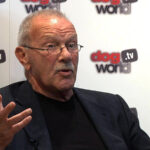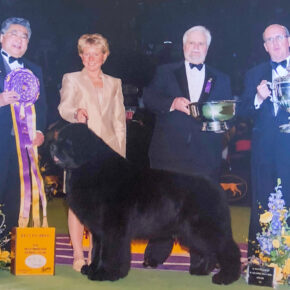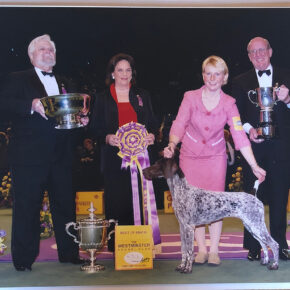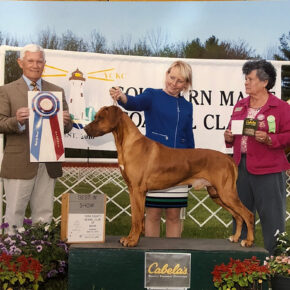Michelle Scott
Interview with Professional Handler
by Lee Grogan
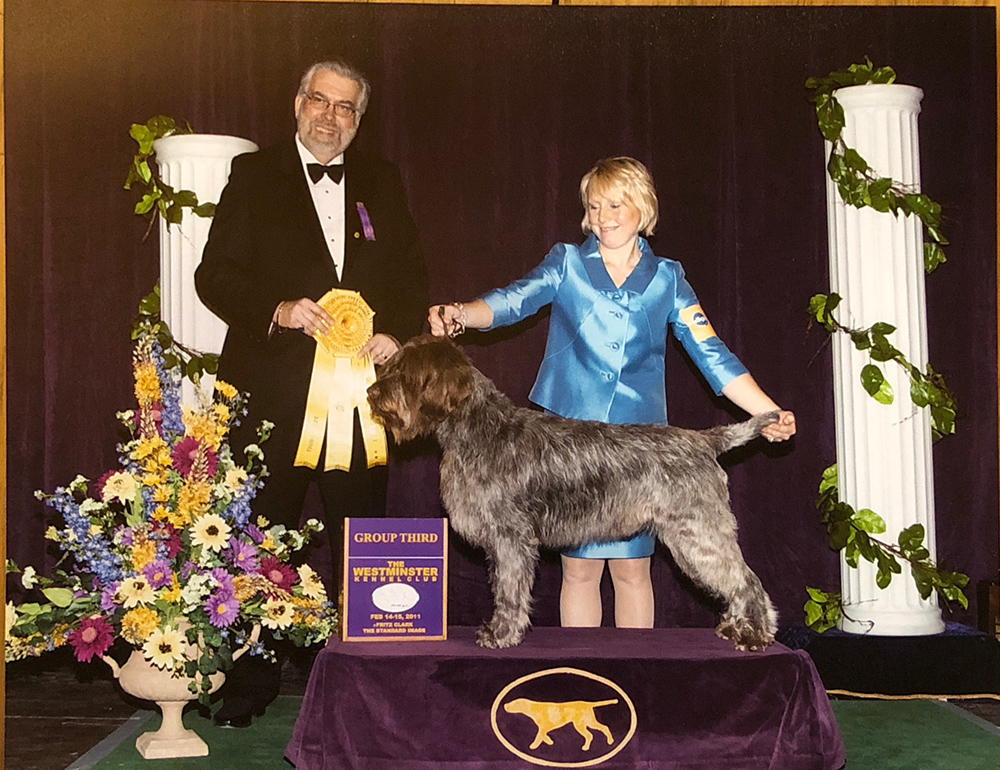
Q: Hi Michelle, thank you for taking the time to answer the following questions for Best in Show magazine.
Please tell us how did you get involved in dogs?
A: My mother arrived from Switzerland in her early 20’s on a work visa and she met my father shortly there after. They together had a love for dogs and as a young child my earliest memories were of my father’s security agency with security guards and their trained guard dogs. So my initial involvement was caring for German Shepherds and Dobermans that were used by the agency as well as the local police force for apprehending suspects. Fast forward from there my mother loved collies and began assisting a famous breeder (Lynn Butler, Milas Collies) with the care of the dogs and whelping litters. That was the foundation that then led my family into the world of show dogs! We had a few Collies we showed but in due time my mother decided to dive back into her Swiss heritage and Bernese Mountain Dogs entered our lives. My mom much preferred being home and raising dogs as opposed to showing them. My dad tried his hand at showing as well and it was not for him either. For me– I loved it! That was the beginning.
Q: Who were your mentors when starting out in the sport of dogs? And how do you feel about mentoring newcomers?
A: My first mentor was John Horan, a local handler that showed my parent’s dogs. Others included Shirley Boxer, Ross and Carol Petruzzo, Gwen DeMilta, Bruce and Gretchen Schultz and Norma Smith. These were the people at the very beginning that taught me and inspired me! As I sit and think about the people and experiences that helped create who I am today I always remember a trip to Oklahoma/Alabama with my mom and our Bernese Mountain Dog. Gretchen Schultz was there as well with a Bernese and every day she won best of breed and I did not. She made a point to come to my mother and I to say “keep up the good work.” Because of her kindness and encouragement I went to California several times to work for Bruce and Gretchen. The time I spent with them (and the learning experience) I would not trade for anything. Mentoring newcomers is so important. Mentoring comes in so many different forms and I have experienced the gratitude people have for the time spent helping them, even as simple as a kind word of encouragement, just like Gretchen offered me all those years ago.
Q: Do you remember your first BIS win?
A: My first best in show was with Ch. De-Li’s Standing Ovation our homebred Bernese Mountain Dog. The judge was Melbourne Downing and I remember him telling me he gave Peter Green his first best in show as well many years before. I always remember that conversation and at the time wondering what my future might hold.
Q: What made you decide to become a professional handler? What career other than dogs would you pursue?
A: Becoming a professional handler was never a clear cut decision on my part. I definitely enjoyed showing dogs but never did I say “I want to be a handler,” and yet I did not have other ideas of what I wanted to do with my life. I did go to college and completed my degree in public relations while showing dogs every weekend. The only time I considered another career path was after winning Best in Show with Josh at Westminster KC (2004). At that time I was exploring the idea of going to school to become a dog chiropractor. My reason was I could not imagine being a single woman handler on the road all the time.
Q: You have had many remarkable wins in your career but two very special ones–BIS at Westminster Kennel Club dog show in 2004 and 2005. Can you tell us about that experience? Please share with us the story of Josh and Carlee.
A: Winning Westminster KC back to back with Josh (Newfoundland, 2004) and Carlee (German Shorthaired Pointer, 2005) was incredible! Josh had the experience of Madison Square Garden from the previous year and we knew I had to keep him focused and grounded. The spotlights and noise of the evening was a lot for a “gentle giant” to deal with. So much positive energy went into each moment of that night and he shined! For Carlee she was a well oiled machine. She always knew her job and did it well. However her night to sparkle was completely the opposite from Josh in terms of how she handled the noise and lights. She soaked up each moment without any help from me. She had a beautiful arrogance as she planted her “stack heard around the world.”
Q: Although you show many breeds, you are well-known as a handler of working and sporting dogs. How did you become interested in these particular groups?
A: Working dogs have always been my strength. Maybe just because my family breed is Bernese Mountain Dogs. From the beginning Rottweilers and Dobermans were breeds that I was involved with simply by coincidence. I am very comfortable with working dogs and can relate to their temperaments and sensitivities. Sporting dogs–when I was young I wanted a Gordon Setter. I never did end up owning one but I worked with a breeder and I showed her dogs (best of breed WKC Ch. Valley View’s Wiseguy) to some nice wins over the years. I have also been involved in Weimaraners (several were number one in the breed rankings and best in show winners). For about 13 years I have had the privilege to show the top winning Wirehaired Pointing Griffon (Ch. Fireside Spontaneous Combustion) and have shown several Chesapeake Bay Retrievers to top rankings in their breed (including national specialty winner Ch. Chesabar’s Pawprints In The Sand). It is curious how we all get connected with certain breeds and have a strong involvement with them over the years.
Q: You make a team with your husband Michael, who is also a handler. How long have you been working together and do you consider that being with someone who shares the same passion and job makes your work easier?
A: Michael and I have been together nearly 20 years now. Definitely working together makes our job easier. We are better as a team and we both have our strong points. As I said above without a partner I’m not sure I would have devoted my life to handling.
Q: How do you decide on who is going to campaign a dog? How is it to compete against each other?
A: Because each of us have different strengths it has always worked out easily figuring out who is the right match for which dog. With that being said there have been a few dogs in our past that began with one of us and it turned out the other was better suited. We are a team and never are competing against each other. No doubt that is a great attribute and I feel as though it is something our clients really value about us.
Q: Would you say that you take a different approach when conditioning and training a working dog compared to a sporting dog? Please share with our readers some advice on conditioning a show dog.
A: For me my passion is training and conditioning. Michael is the groomer in our family. Physical conditioning of a sporting dog versus a working dog is more intense. Working dogs, especially the large boned and more bulky dogs, need more low impact and less regimented workouts. One has to be very careful about the joints on large working dogs. Things like free play and water treadmill are excellent options. Sporting dogs can benefit from a more regimented exercise plan as well as free play.
Q: We know that your personal pets are Chihuahuas. Please tell us about them and what makes them special? Do you have any other dogs of your own?
A: I love Chihuahuas. Muffin my 11-year-old was the first Chihuahua I ever showed. He in quirky to say the least and he has been with me for about eight years. Louie is nine and also a retired show dog. For us it is easy to have little dogs as pets. We have just the two and they hang out on the front seat when we are on the road. They do not take up any room that is reserved for a show dog.They are very portable and super cute.
Q: Which breed would you have if you did not have Chihuahuas?
A: I love all breeds so I cannot easily say if not for a Chihuahua what other breed I would have. Honestly I cannot imagine any other breed instead of a Chihuahua.
Q: Please name three dogs of the past that you admire (not shown or owned by you).
A: Three dogs from the past I admire: Ch. Nanukes Take No Prisoners, Ch. Royal Tudors Wild as the Wind and Ch. Torums Scarf Michael.
Q: Are you superstitious? Do you have any special habits with your top dogs?
A: I am not a superstitious. No special habits except each dog has its own special things like leash, brush, cooler. I’m not sure that is being superstitious or rather having a routine.
Q: What is your handling philosophy?
A: My handling philosophy is positive energy and make it fun. Pretty simple. Also practice a lot and make sure dogs are in top condition.
Q: What part of your job do you like the most and what part the least?
A: What I love the most about my job is conditioning,training, and socializing. Beginning with the development of puppies–I love being part of breeding programs, working closely with each new generation, and bringing along the “special ones” all the way through a specials career. I love making people happy and bringing them joy when their dogs succeed. I love all the interesting people I meet showing dogs. The least favorite part of my job is the long tiring days. The alarm going off at 4:45 on show days is getting harder each year.
Q: Do you have a favorite show?
A: Without a doubt the Westminster Kennel Club is my favorite show!
Q: What do you think about Lyndhurst as the new venue for Westminster this year?
A: Lyndhurst Estate is an excellent alternative for Westminster Kennel Club. Such trying times due to Covid and the WKC members have been working endlessly to make sure WKC is special no matter what curve ball is thrown at them. I am one of the lucky ones that has fond memories of shows on those grounds and am very excited to be back for this special event. While I love New York City, it will be a lot easier to attend the show outside the city.
Q: What is your greatest concern regarding the sport? If you could, what would you change in the dog world?
A: Two of greatest concerns about the sport are first many of the great breeding kennels are gone. In current times those type kennels are frowned upon (dog legislation) and I feel as though quality in a lot of breeds has suffered. I see more “hobby breeders” that results in not seeing breeding programs reflected in the ring where you can immediately recognize what lines the dog is from. My second concern is more dog fanciers need to give back. I wish everyone involved in dog shows would be part of a club and be an active participant. I find people are ready to criticize because they are misinformed. Especially over the last year dealing with Covid and so many show cancellations.
Q: Is there anything in life that you would like to do other than being involved with dogs?
A: Being involved with dogs has given me a very good life and I feel very blessed to be able to do what I love. Michael and I love to travel. Seeing and experiencing the world is our passion. Our motto is “work hard to play hard”. So while we are very busy with our job we do take time off. I believe life should have balance.
Q: What advice would you give to young people who aspire to become professional handlers?
A: My advise to anyone wanting to be a professional handler is first and foremost expect to work hard. Michael always says it best, “professionals in any job that are successful put in long hours and work hard.” Secondly, never undercut yourself or sell yourself short. Your time and effort has value. Third, keep balance in your life. Balance work and pleasure. Fourth, live life in the present but save to prepare for the future and have a rainy day fund. Last advice I would give is that customer service and customer relations are essential.


